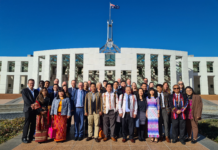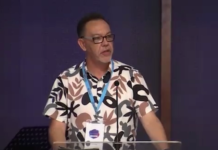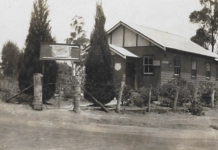As we approach this Federal election I’m reminded of God’s people in Jeremiah 29 being in exile within an alien and ungodly land yet God through the prophet, calls them to grow in community and then together to ‘also, seek the peace and prosperity of the city to which I have carried you into exile. Pray to the Lord for it, because if it prospers, you too will prosper’ (v.7). Even though this is only a temporarily dwelling place, as God has future plans for them elsewhere, they are to live in and seek the well-being of that society.
God also calls on us to be good citizens, and part of this involves voting in an informed and conscientious way that seeks the peace and prosperity of our society. Rather than vote selfishly, it is fundamental to the Christian outlook that our lives be devoted to the good of others before ourselves (Romans 12:10). Each of us should not look to our own interests, but to the interests of others (Philippians 2:2-4). Different Christians will come to different conclusions about how they should vote. Christians may legitimately think differently on many issues. We may also attach different levels of importance to various issues but we are all called to seek the good for our society.
There are many issues in this election which will influence how people choose to vote, including economic management, employment, health, education and security policies, etc. We may be concerned about leadership. As Christians there may be numerous other issues that might not be as high on the agenda of the various political parties but concern us and about which we need to be informed in considering how we vote. These include issues around overseas aid and development, asylum seekers and refugees, climate change, domestic violence, homelessness and gambling. Which parties and policies promote the values of God; the values of justice, harmony, sexual restraint, honesty, family and mercy? Who defend the weak and the needy, the poor and the oppressed? The purpose of this email is not to direct people to vote in a particular way, but to encourage you and your congregational members to be fully informed when you vote.
One unique issue that concerns many of us at this election is that of same-sex marriage as following the election decisions will be made about whether to redefine the definition of marriage. As well as impacting the place of marriage in society, we need to recognise this is part of a broader movement around sexual equality rights, seen for instance in the Safe Schools Coalition material which promote homosexual sex and gender fluidity.
It is likely that legislation to implement same sex marriage will not contain sufficient protections for religious freedom. Public dissent from same sex marriage will be dealt with by anti-discrimination laws. As a result, our ability to exercise biblical ministry through our Christian schools, aged care facilities, caring organisations and even through our local churches could be severely constrained. This has certainly been the experience in overseas jurisdictions where similar changes to law have led to the diminution of the freedoms that are essential to our faith.
For this reason, it is important for Christians to be aware of the policies of the major political parties on the issue. The ABC has created this helpful infographic.

Source: http://www.abc.net.au/news/2016-05-25/key-issues-where-the-parties-differ/7421638
This is not the only issue we should consider when deciding how to vote but it is an important one alongside other significant issues. No party is perfect and no party represents a comprehensive Christian policy platform. Our vote isn’t an endorsement of every detail of a particular party’s policies and we need to take all these into account when considering where our primary and preferential votes may go.
In our conversations and discussions both before and after the election as we seek to communicate in truth may we also do so with love, respect and integrity, despite how others may speak back to us in return. We need to speak from a posture of humility, as God’s servants rather than from a position of privilege or entitlement.
Let us pray for our country and for those leaders and representatives who are elected to govern our country after July 2, whoever they might be.
I encourage you to call our congregations to prayer this Sunday and invite you to share the content of this email either in your bulletins or other notices.




































